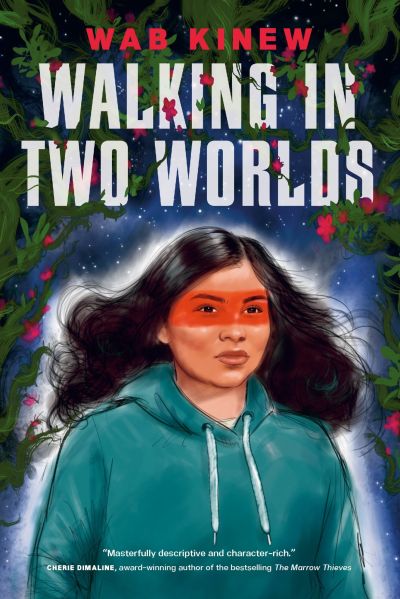Happier Than Ever
Walking in Two Worlds
By Wab Kinew

18 Nov, 2022
Wab Kinew’s 2022 Walking in Two Worlds is a near-future science fiction novel.
Recurring pandemics have forced North American society to embrace hitherto unknown or unpopular ways to cope with disruption. However, some fundamentals of North American1 life remain unchanged. There are still sequestered territories, Rez, for Indigenous people. Teens living on them are required to attend school, and school is for many teens an exercise in awkward discomfort.
Luckily for Anishinaabe teen Bagonegiizhigok “Bugz” Holiday, she has another life, in the Floraverse.
The Floraverse is a virtual reality of unparalleled sophistication; in it, Bugz is almost a demigod. Able to manipulate the environment in ways other players cannot duplicate, Bugz is famous in the verse and the real world as a player of unmatched ability. With fame comes income, which Bugz, not being an idiot, is carefully squirrelling away.
Bugz is an abomination to Clan:LESS. This grand alliance of incel gamers does not appreciate rivals. They particularly resent being outplayed by someone who has the temerity to be a girl. Their carefully planned attacks on Bugz always yield the same result: humiliating defeat.
Half a world away, the Chinese state considers Feng suspicious on a number of grounds. First of all, he’s Uyghur. While he may have been reeducated as a child, his mere existence suggests a potential for deviance. Second, he is an avid Floraverse player. Since the Floraverse is beyond the Chinese state’s ability to control, Feng’s obsession with the game is tantamount to criminality. Conscious that it is only a matter of time before Feng is detained, his family sends him to live with his aunt Liumei, a nurse on the Biiwaabik Rez. Which as it happens is the very Rez that Bugz calls home.
The pair have the Floraverse in common. They also have romantic chemistry. There is, however, the slight snag that Feng is an dedicated Clan:LESS member. Falling for the embodiment of everything Clan:LESS hates will not improve his social standing with his fellow misogynists. His affiliation with Clan:LESS hardly improves his standing with Bugz. The tenuous romance survives only because Feng manages an insane level of double-think when it comes to Bugz.
One might expect Feng’s allies to be outraged at his dalliance with their great enemy. But Clan:LESS knows an opportunity when they see one. Unbeknownst to Feng, he gives Clan:LESS the means to uncover Bugz’ closest-held secrets. Feng’s inadvertent betrayal ensures that Bugz is defeated and exiled from her beloved Floraverse.
Worse waits for her in the real world.
~oOo~
The target market here is not people like me, as made clear by the introductory material and the lengthy list of help-sources for Indigenous teens at the back of the book. In fact, I am moderately convinced nobody of my demographic makes a significant appearance in the book, if indeed any survived the pandemics. There are lots of books focused on people like me; the fact that there is one that doesn’t does not make me any worse off. Although it might mean I overlooked or misconstrued something important to the target audience.
Things can belong to more than one category at a time. Walking in Two Worlds is science fiction. It is also CanLit (Canadian literature), which means that at least one of the supporting characters is going to die. Tragic, unforeseen bereavement is a defining feature of CanLit. If you discover that you are a character in CanLit, try to be the protagonist. Just be aware that this may not be enough to save you.
At the risk of being an unromantic grump, I don’t understand how Bugz’s risk assessment2 of Feng could possibly have concluded he was boyfriend material. Dating a Clan:LESS member is on par with dating a Jordan Peterson acolyte. Catastrophe is ensured, with the only question being the precise form it will take.
It may help the Bugz-Feng relationship that it’s just as hard to be a Uyghur in China as it is to be an Anishinaabe in North America. Both peoples are subject to the whims of powerful nation-states which favor assimilation to the dominant ethnic group. Assimilation is often forced.
(Note that in Canada, while residential schools are currently in disrepute, it is still common for First Nations parents to lose custody of their kids.)
The author, Kinew, is leader of the Manitoba New Democratic Party, currently the opposition. Kinew is, as far as I know, the only provincial opposition leader whose young-adult SF won the Aurora Award. Other party leaders need to step up their game. I don’t know how I am supposed to take their policies seriously if they cannot write at least one work of award-winning literature.
As one might expect from an award-winning novel, Walking in Two Worlds is an engaging, skillfully-written near-future SF novel.
Walking in Two Worlds is available here (Amazon US), here (Amazon Canada), here (Amazon UK), here (Barnes & Noble), here (Book Depository), and here (Chapters-Indigo).
1: The advantage of ebooks is that it is very easy to quickly check for certain words. Words and phrases not appearing in the novel itself: Canada, province, USA, United States, ‘state’ in the sense of a sub-national region, premier, and prime minister. ‘President’ appears, but while we learn that a certain Will Smith is president, we do not discover what he is president of or if the Rez falls within his domain. North America appears once. Neither the American ‘reservation’ nor the Canadian ‘reserve’ appears; the community is only ever referred to as the Rez.
2: Bugz is no idiot. Her mastery of the Floraverse isn’t a fluke; she’s overall high in common sense and general intelligence (frex, she’s very careful about not squandering her profits). It’s almost as through romance is a realm that confounds standard cognitive tools.
